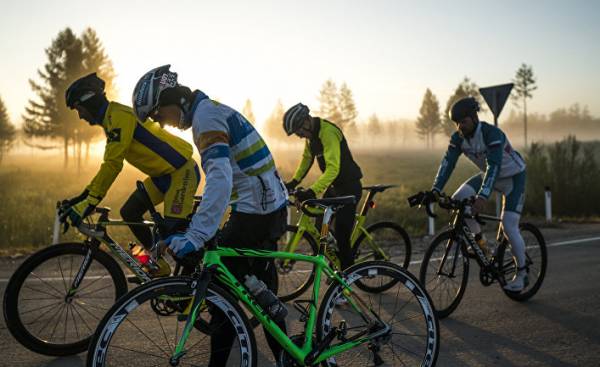
TRANS-Siberian extreme race (Red Bull Trans-Siberian Extreme) is the longest Cycling race in the world — a grueling test of endurance, consisting of 14 stages, extending from Moscow to Vladivostok, and its total length is more than 9 thousand kilometers.
The distance is so huge that the participants of the race to cross seven time zones. Their path runs through the forested hills and along roads filled with trucks. Riders passing on the sidewalks, on the cobblestones, and gravel, as well as cross the seemingly endless fields and meadows. This year the race was attended by eight men and two women — they all started July 18 at the red square in Moscow. After the start, one by one they began to drop out of the race, and by Monday there are only three members — Pierre Bischoff (Bischoff Pierre) from Germany, Alexey Shchebelin from Russia and Marcelo Soares (Marcelo Soares) from Brazil. On Wednesday, the three will start on the final stage 14, and each of them tries on 10 August the first to pass in front of Opera and ballet in Vladivostok, a port city on the border with China.
Even before the completion of the race the organizers have already started to think about another existing challenge is how to involve the participation of more women in the next year and how to keep them as long as possible as participating in this competition. This year for the first time women took part as individual riders, but neither one of the two participants failed to pass half of the 14 stages, although they are experienced athletes in terms of competition on endurance.
Women are a minority in the world of Cycling and endurance racing, and some racing formulate their rules based on gender principle.
It happened with the race, the Race Across America with a length of about 5 thousand kilometers from California to Maryland, the participants of which 20% are women. According to Rick Boethling (Rick Boethling), Executive Director of the race, the organizers have set different rules for men and women. If the riders men do not finish this race in 12 days, they will be entered into the record as “not classified”, and this means that they can continue to stay in it if you want, but officially they have not considered its participants. As for women, they are given a further 21 hours.
“Historically, that there is a distinction between participating in competitions for men and women — said Mr. Boethling. So, we essentially gave them an extra day so they could finish, and this principle is taken from other competitions and sports in which the athletes are compared with high-level athletes at the highest level.”
TRANS-Siberian race, which is held for the third time, trying to make this event more attractive for athletes, however, its organizer, Paul Bruck (Paul Bruck), who is currently in Russia on Monday in an interview said that the next steps are not yet clear.
One of the options consists in the fact that women participated in the two-man teams that will allow them to change and rest more. This year both women — Shangrila Rendon (Rendon, Shangrila G.) and Thursday Gervais Dubina (Dubina Thursday Gervais) are unable to achieve the required speed of 21 kilometers per hour, and also lagged behind in the recovery period and eating in between stages.
“We just want to be in this race participated women, and we believe that more logical would be to have a women’s team of two people,’ said Mr. Brooke. — They will be able to go as fast as the speakers individually with men”.
Ms. Rendon, a 35-year-old American of Filipino descent and holds the world record in the “fivefold” ultra-triathlon (the Guinness World Record for the Quintuple Ultra Triathlon), said she had sleep problems, abrasions from the seat, with convulsions and with the bad weather, including hail, and trucks clogged the roads.
“In the end, I somehow managed to survive, she said. — It was extreme. Nothing like that, of course, I’ve not experienced before”.
Left alone after the disappearance of the race, Ms. Rendon, Ms. Gervais is a jerk, in the end, is too outdated for the remaining men who went to a group and thus help each other. The start time was the same, but men were always finished stages for a few hours before, and this meant that women remained less time for recovery, massage and eating, she said.
She officially withdrew from the race after the sixth stage, although it tried to complete the seventh stage.
“I did everything possible to keep up with the guys, but based on statistics we know that men go much faster, she said. — Very often I have to pedal alone.”
According to her, overall, it was a “great experience” for her, and she praised the support teams and the organization as a whole, however, she believes that the rules should be changed in order to allow the women to start ahead, and then they will have more time to complete stages when using the shortened routes.
However, Mr. Brooke has ruled out such an option. “In this race we have a pretty tight time frame, and we can’t run two races at once, — he stressed. — It would be impossible from the point of view of logistics”.
48-year-old racer from Bloomington Gervase Dubin said that she dropped out of the race partly because of the “scary dangerous” road conditions.
“Three times moving car coming right at me on the roadside, she said. For me it was too much and I dropped out of the race”.
As in any other battle in the calculation it was necessary to take the supply routes. According to Mr. Brooke, 27 cars, including one for each party — followed the cyclists with supplies of medicine, food, spare parts and other necessities. When the racers behind the car with food, then food was brought to them further, he said.
According to Ms. Gervase Clubs, sometimes support machine was moving with the men of the first group and not with the slow group. In one place the traffic was so dense that she had to stop because the car’s maintenance could not catch up with her on the sidelines.
According to her, one of her errors was that she brought the wrong food, and so sometimes she had to feed race mix or fruit. The first three stages were relatively flat, whereas in Siberia, the terrain was hilly and the road is bumpy.
“If mentally I was stronger, I could hold out longer, she said. In my opinion, this race is 90% dependent on the head, and it is, actually”.
Ms. Gervase Dubin is an artist who survived cancer. According to her, most of her life, she is engaged in Cycling and participates in triathlons. For this race she was preparing for more than a year.
“It was not enough to hold together with men, and I knew it, she said. Women are simply not able to complete such a race in the same time frame as men. I knew it before”. But, nevertheless, she wanted to participate in it. “I offered myself as a Guinea pig”.







